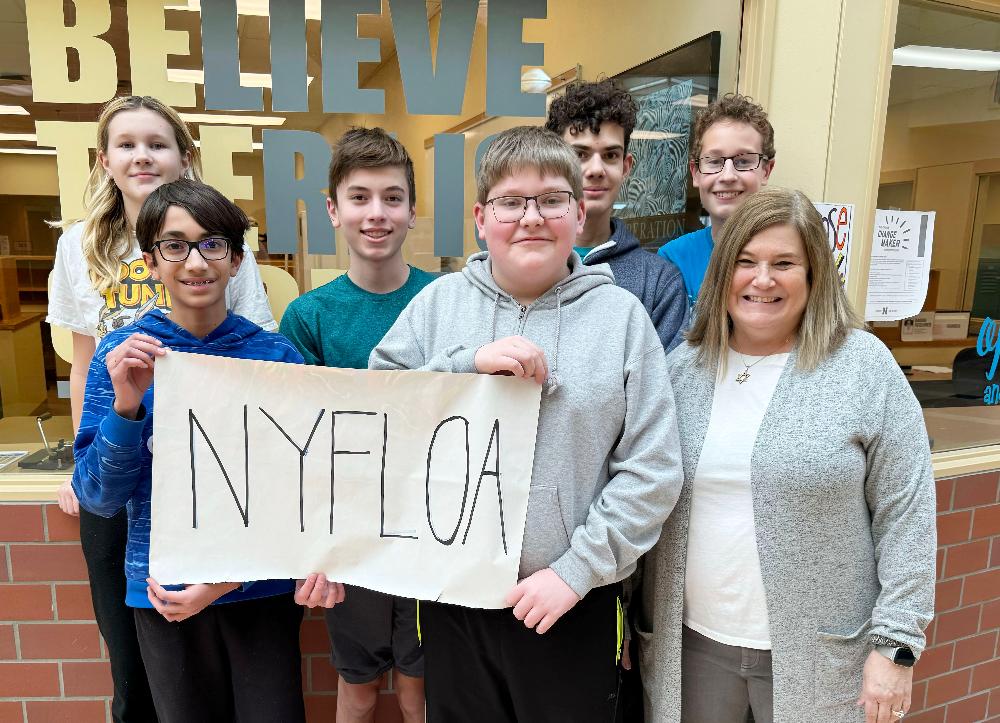Lux students generate recognition with 2024 Future City competition
If you wanted to build a renewable-energy-based city on a peninsula in Iceland, how would you go about doing that?
Lux Middle School students answered that question in successful style during their appearance in a national city-creating contest.
Members of the Future City after-school club competed against students from the United States, Canada and China at the DiscoverE 2024 Future City Competition. The eighth-grade team of Alex, Chloe, Luigi, Vasya, Evan, Kellen and Isaiah secured the trip to Washington, D.C., by winning the state contest.

Chloe, Alex, Vasya and Luigi flew to the East Coast for the international event. Chloe said it was exciting to represent Lincoln Public Schools in the nation’s capital. Students constructed a model of their city and shared a detailed project plan, 1,500-word essay and seven-minute presentation with judges.
“Competing in general was really fun,” Chloe said. “I thought it was kind of cool seeing all of the other models and other people’s presentations and how they competed in different ways.”
Lori Feldman and Christy Eichorn both helped the team as mentors. Feldman teaches computer science and technology at Lux and is the club’s LPS staff sponsor, and Eichorn has been mentoring Lux Future City groups since 2019. Both said the program provides a wealth of lessons for future engineers, scientists and designers in grades 6-8.

“Now that they’ve seen and been to state and national competitions, I feel like there are kids who are thinking, ‘Wow, this would be a cool career,’” Feldman said. “It could be model building for artistic sets. It could be architecture. It could be urban design. It can be anything they want it to be. It’s really such a great program for their futures.”
“I have seen kids grow to become civically engaged, enhance their planning and engineering skills and flourish as speakers and presenters,” Eichorn said. “I am proud of this team’s achievement. I want everyone to know that this is an opportunity for all children to imagine, explore and build robust, sustainable cities of the future.”
Students in this year’s contest followed the theme of Electrify Your Future. They had to forecast 100 years from now and build a fictional city powered entirely by electricity generated from renewable energy.
Lux students began brainstorming ideas in August and created a comprehensive plan for a town they named Nyfloa. They determined how Nyfloa would provide safe stormwater and sewage collection systems, clean drinking and bathing water, reliable public transportation and a modernized electric power grid. They also explained their city-building strategy and how their plan complied with safety codes and technical standards.

Feldman said it was inspiring to watch students work together to meet their goals.
“It was a total independent group,” Feldman said. “I was here for support and our mentor was here for support, but they had to decide.”
Alex and Chloe said the Future City experience helped the Lightning improve teamwork and time management talents. The group had to meet strict project deadlines to qualify for state and international contests.
“It develops a lot of life skills like teamwork,” Alex said. “We had to work together, because we only had a certain time period to do everything. We definitely did a better job of that this year.”
“We definitely learned a lot of time management,” Chloe said. “Getting stuff done on time and doing what you’re asked to do is really, really important in this project.”
Lux’s team researched potential city locations based on future sea level projections, availability of energy supplies and possible tourism opportunities. They felt Iceland’s capital of Reykjavik checked all of those boxes and decided to build Nyfloa on an Atlantic Ocean peninsula.

The group relied on proven energy sources such as offshore wind and geothermal electricity from Iceland’s active volcanoes. They also discovered an emerging technology called a waveline magnet, which floats on water and converts wave energy into electricity.
“Because of the Gulf Stream, we found that Iceland had consistent winds, which is great for wind power,” Alex said. “And a new source of energy that we figured out was ocean currents, ocean waves, to generate power.”
The Lightning also followed rules when building the physical city model. The budget could not exceed $100 and many items had to be made from recycled materials.

“You had to be very creative,” Feldman said. “Custard cups could become skyscrapers, or water bottles could be a pole to hold something up. They used a lot of different engineering skills.”
Sixth-grade students Millie, Phoebe, Evan, Rhys, Nolan and Liam also competed at state. Feldman said her goal is to have at least one team in each grade represent Lux next year.
Feldman said many Lux students have noticed several large trophies that are displayed in her classroom. She felt this year’s achievements will inspire more Future City groups at school.
“Now, kids in every class are looking at those trophies and asking, ‘What is this Future City thing?’ Then they’re saying, ‘I so want to do this next year,’” Feldman said. “We have all of these kids who want to do this. It’s fantastic. It means kids are thinking beyond video games or whatnot. They’re thinking about how can we make our world better in the future.”
Do you have a story idea? Share it with the LPS Communications Team by filling out this form!
Published: April 3, 2024, Updated: April 3, 2024
Members of the Lux Middle School eighth-grade Future City team smile with a sign displaying the name of their new city. Students created a renewable-energy-based city on a peninsula in Iceland for the contest. The team won the state championship and earned a trip to Washington, D.C., for the international contest.


